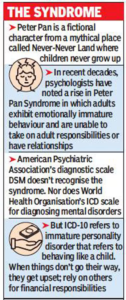In news
Recently, the Bombay High Court granted bail to a 23-year-old rape accused on the ground that the accused suffered from a psychological condition known as Peter Pan Syndrome. The man allegedly sexually assaulted a 14-year-old girl.
What is Peter Pan Syndrome?
It is a psychological condition that is used to describe an adult, more in men than women who are socially immature. In simple words, it can be called an overgrown child.
More about Peter Pan Syndrome
- The term was coined by psychologist Dan Kiley to explain the behaviour of such men who ‘refuse to grow’ and behave their age.
- The term ‘Peter Pan Syndrome’ first appeared in 1983, in a book authored by Dr Dan Kiley titled ‘Peter Pan Syndrome: Men Who Have Never Grown Up’.
- He described it as a “social-psychological phenomenon”.
- The World Health Organisation (WHO) does not recognise Peter Pan Syndrome in its list of mental illnesses.
- The term has its origin in literature, a play called Peter and Wendy by Scottish playwright JM Barrie, who wrote this play in 1904 and a novel by the same name in 1911.
- Peter’s character is one of a care-free young boy, who never grows up.
- He features in several of Barrie’s books and plays, and has since been adapted in numerous films, television series and comics.
- It is said that people who develop similar behaviours of living life carefree, finding responsibilities challenging in adulthood, and basically, “never growing up” suffer from Peter Pan Syndrome.
Symptoms of Peter Pan Syndrome
- As Peter Pan Syndrome hasn’t officially been diagnosed as a health disorder, there aren’t clearly-defined symptoms or characteristics or even reasons which cause it.
- However, it could affect one’s daily routine, relationships, work ethic, and result in attitudinal changes.
- The ‘Peter Pan Syndrome’ affects people who do not want or feel unable to grow up, people with the body of an adult but the mind of a child.
- They don’t know how to or don’t want to stop being children and start being mothers or fathers.

Wendy Syndrome
- Wendy Syndrome takes after Wendy Darling, who appears beside Peter Pan but is seen as playing an antithetical character.
- She is often called a “mother”, taking on the role of an adult or someone more mature.
- People suffering from Wendy Syndrome as often seen “making decisions, tidying up messes, and offering one-sided emotional support.
















